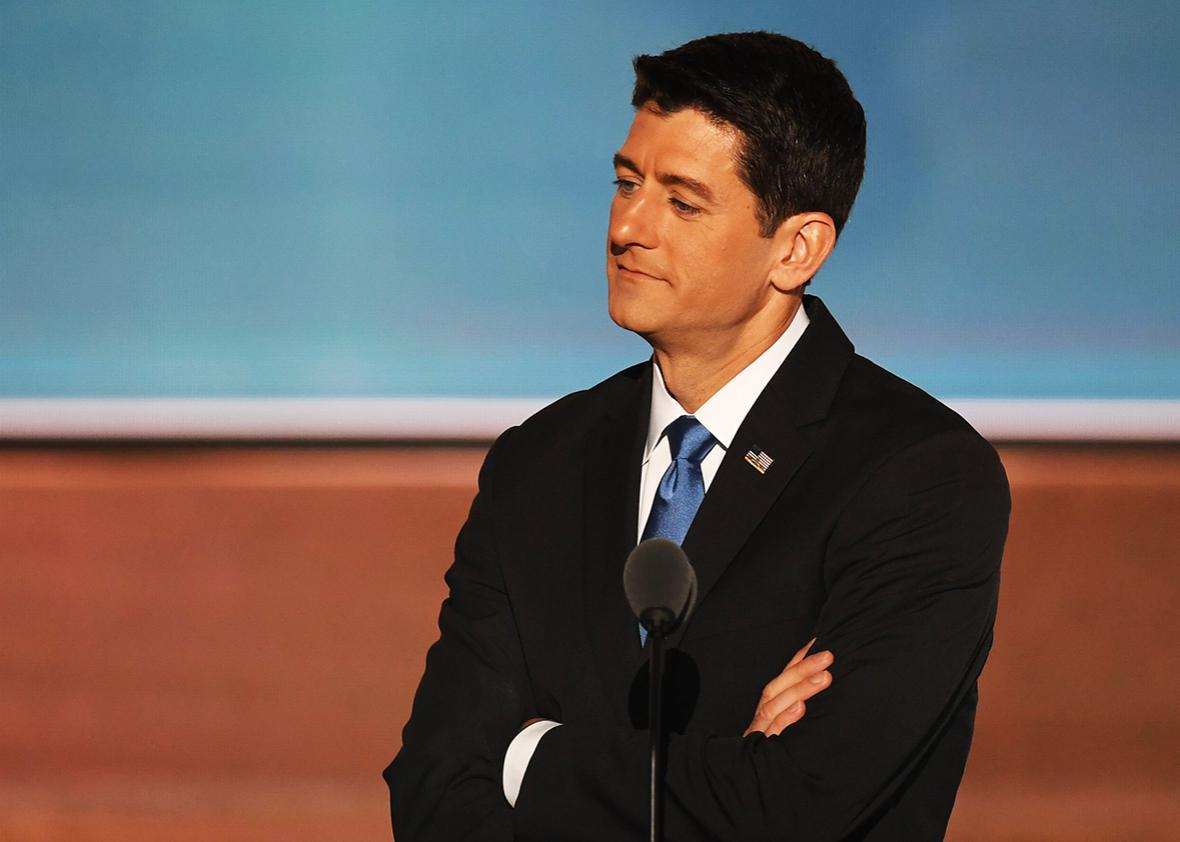On Tuesday, President Barack Obama took square aim at any Republicans who refused to renounce Donald Trump’s candidacy in the face of his ever-mounting boorishness and incompetence, citing Trump’s attacks on Gold Star parents Khizr and Ghazala Khan and his views on Russia. “The question they have to ask themselves,” President Obama said at a press conference, “is: If you are repeatedly having to say in very strong terms that what he has said is unacceptable, why are you still endorsing him?” Obama specifically name-checked the speaker of the House, the Senate majority leader, and erstwhile rival Arizona Sen. John McCain. These are not the only Republicans who have recently chastised Trump for his treatment of the Khans without withdrawing their support for the nominee.
The super top-secret insider political reason that Obama said this is probably … that it’s something he believes and felt like saying? He is not the first commentator to take note of that missing final step in these Republicans’ statements rejecting Trump’s treatment of the Khans. “There has to come a point,” Obama continued, “at which you say somebody who makes those kinds of statements doesn’t have the judgment, the temperament, the understanding to occupy the most powerful position in the world.”
Or there doesn’t. Obama may or may not have been playing politics with his comments, but his comments will play politics all on their own. What he has done—and this is a sad thing, by the way—will even further discourage those already-squeezed GOP leaders or politicians up for re-election from reneging on their backing of Trump. If they do so now, it will look like they’re taking instructions from the malicious Obama. If they stand firm, likelier than ever now that Obama has spoken up, they will continue to have the albatross of Donald Trump and his second-by-second nonsense hang around their necks. Obama may or may not have meant to torture them this way, but that’s the most likely effect.
Not all elected Republicans who have endorsed Donald Trump are doing so out of cowardice. Some, like Alabama Sen. Jeff Sessions, appear to genuinely like the dude. Others simply want a Republican partner in the White House—and Republicans in control of federal departments and agencies, where the real day-to-day moves to advance Republican goals can be made by more professional types.
Others seem to have fully submitted to political pressure, and this pressure is of different sorts. The Republican National Committee has no agency here; its explicit duty is to help elect Republicans to higher office. Party leaders like Mitch McConnell and Paul Ryan are too important within the GOP not to support its presidential nominee.
Every other elected member of Congress is free to follow his or her own political and moral reasoning, but so far, no Republican in national office who’s up for re-election has endorsed Hillary Clinton. Illinois’ Mark Kirk, the most endangered senator in the country, has withdrawn his support for Trump, but that’s as far as he’s gone. With the Khan attacks pushing him over the top, New York Rep. Richard Hanna endorsed Clinton on Tuesday morning. But Hanna is retiring after this term. It would be shocking to see a Republican up for re-election jump not just halfway, to neutrality, but all the way to an endorsement of Clinton. Even if you’re in a tight race and want to maintain swing voters, you still have to turn out your own Republican voters. And a sizable portion of Republican voters made clear in the spring that they like Trump.
But as Obama pointed out, the constant routine of distancing without renouncing has got to be tiring—for both candidates and, especially, their communications staffs—and the option of untethering completely must get more tempting by the day. “This isn’t a situation where you have an episodic gaffe,” Obama said. “This is daily.” (We’d say that in these past 48 hours, it’s been more of a minute-to-minute thing, but never mind.) “There has to be a point at which you say, ‘This is not somebody I can support for president of the United States, even if he purports to be a member of my party,’ ” Obama continued. “The fact that that has not yet happened makes some of these denunciations ring hollow.” And the fact that Obama said it helps ensure the pattern of these hollow denunciations, to the dismay of both Obama and the candidates issuing them, will continue apace through Election Day.
Maybe there is some new bottom Trump will hit that spurs candidates like McCain—or Wisconsin Sen. Ron Johnson, or New Hampshire Sen. Kelly Ayotte, or Pennsylvania Sen. Pat Toomey—into a total separation. Certain politicians may, for example, see Trump’s refusal to return the political favor to them as the gravest moral offense there is. To paraphrase Donald Trump, though, the bottom just got 10 feet lower following Obama’s endorsement of potential un-endorsements. Maybe if Republicans had spent the last seven years treating Obama as a reasonable person with whom they disagreed on certain issues, Obama could say something reasonable and they wouldn’t feel politically pressured into doing whatever the opposite is. And maybe Donald Trump wouldn’t be the Republican presidential nominee in the first place.
